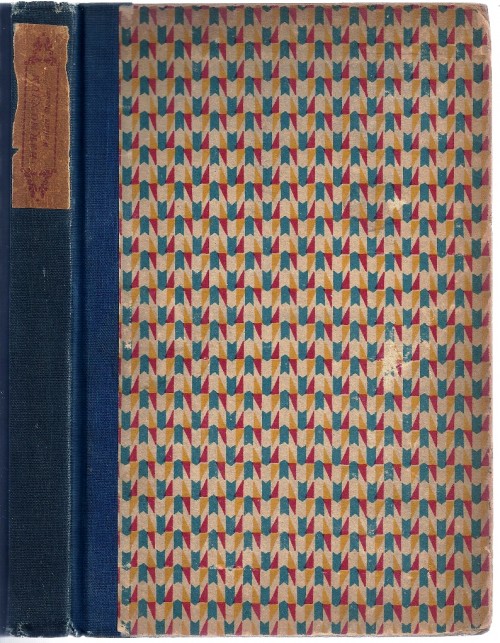Quasi-unintelligibility (Part 4)
Less than a decade after Stevens’s “Man Carrying Thing” first appeared in Yale Review, its first sentence had become so useful and succinct an apology for his more challenging work, it would even show up in his New York Times obituary, which ran on August 3, 1955, the day after he died of stomach cancer in Hartford’s St. Francis Hospital:
When [Stevens’s] poems sometimes seemed obscure, he explained: “The poem must resist the intelligence almost successfully.” However, in his personal and business life there was a very clear discipline.
The obituary dutifully notes Stevens’s achievements, including the Pulitzer Prize he won earlier that year for his Collected Poems, but it also devotes an alarming amount of its limited space to making much of his reputation as a difficult poet. It’s almost painful to think of the following paragraph appearing in the announcement of the great poet’s death:
Wallace Stevens was a weaver whose threads were words. He spun webs to trap his moods. “Hence, unpleasant as it is to record such a conclusion, the very remarkable work of Wallace Stevens cannot endure,” wrote Percy Hutchison, the late poetry editor of The New York Times. Mr. Hutchison had just reviewed the new edition of the poet’s Harmonium. That was in 1931, eight years after the volume first appeared. The poetry editor described the poems as closest to pure poetry. He explained that such works depended for their effectiveness on the rhythms and tonal values of words used with only the remotest link to ideational content. He remarked that the poems were “stunts” in which rhythms, vowels and consonants were substituted for musical notes. But this achievement is not poetry, Mr. Hutchison said before adding: “From one end of the book to the other there is not an idea that can vitally affect the mind, there is not a word that can arouse emotion.”

It’s that last sentence in particular that hurts. I almost don’t mind the idea of Stevens spinning word-webs “to trap his moods,” although the phrasing is obviously silly and the idea is only partly true, and only some of the time. It’s hard to imagine what kind of mood “The Auroras of Autumn” might be the web for, but I don’t doubt that there are shorter lyrics about which Stevens, who in his “Adagia” claimed “A poem is a café,” might have considered saying something close to “A poem is a web to trap a mood.” Then there’s the claim that Stevens’s poetry “cannot endure”—all we can do is guffaw, and pity Mr. Hutchison, whoever he was, and wish the readers of the Times had known better. And then the comment might even add a new sheen to our respect for Stevens, who was clearly up against some pretty radical opposition in his own day. We already know that to be the case but sometimes to encounter specific instances of what we already know in general can restore that thought to life a little, dust our knowledge off. The word “stunts” is just plain spiteful. What kind of dimwit calls “Sunday Morning” a stunt, or “The Snow Man”? Before the obit’s end, the unnamed author of it accounts for Stevens’s recent Pulitzer with some serious condescension—unless there’s another way to read these lines and I’m just deaf to it at this point:
In The Collected Poems of Wallace Stevens, which appeared in 1954 to mark his seventy-fifth birthday, came the realization that he had, in fact, twisted an idea or two into his poetic yarn without dulling the shimmer of the finished product. His earlier illusions were now positive beliefs expressed freely in verse.
So the web-weaver managed an idea or two after all! And without “dulling the shimmer”! Let that be a lesson to us all. Oh, I guess it’s too easy to poke fun at Hutchison. But why forgo the opportunity just because it’s easy? Because it’s that last sentence that really gets me, still: “From one end of the book to the other there is not an idea that can vitally affect the mind, there is not a word that can arouse emotion.” Come again, Percy? Hutchison seems to have been a fan of big clear-cut familiar emotion, and his other reviews (I’ve read a few now) go panting after it like a Labradoodle. For example, at the end of his review of Hemingway’s A Farewell to Arms, also published in the New York Times, he predicts that readers will debate whether this new book is better than The Sun Also Rises, but Hutchison has it figured out already:
And yet for the present reviewer The Sun Also Rises touches a note which Hemingway caught once, and, in the very nature of the thing, cannot touch again. In the attachment of Lady Brett for her physically incapacitated lover there is a profound and genuine affection which has something of inspiration. And the pathos of Lady Brett, that she can maintain this only by derelictions, evidences psychology so subtle that it has hitherto evaded the literary worker, and been not always discernible to the scientifically schooled.
Blech. No wonder Stevens left him cold. I’m not going to call Hutchison a melodramatic twerp, but he sure did review like one.

As for me, Wallace Stevens’s Collected Poems was the first book of poetry I bought. I was seventeen. The second book of poetry I bought was Anne Sexton’s Complete Poems which I ordered from the bookstore across the street from my high school, La Salle Academy in Providence, a Catholic school—the same school Ted Berrigan went to, as I understand it. An odd pairing, Stevens and Sexton, I know. Go figure. I was introduced to both poets in my AP English class. The other poets I liked at the time were Shakespeare (the plays), Keats, and Dickinson. I also liked Dylan Thomas’s “Fern Hill.” I remember one day we read “Sunday Morning” in class and of course it puzzled me but I also marveled at it and it made me feel elevated and like I needed to read more. Perceiving in its sixth stanza an echo of Keats’s “Ode on a Grecian Urn,” I felt like I was onto something, halfway to solving a mystery. So after school one afternoon I took the bus to Cellar Stories, a great used bookstore in Providence that’s still in operation, found a copy of Stevens’s Collected Poems (it sits beside me as I type), and I opened it up among the shelves and read this:
My titillations have no foot-notes
And their memorials are the phrases
Of idiosyncratic music.
I stopped. Time stopped. I felt like I was on the brink of some kind of seizure. I felt adrenalized, my breath quickened, my eyes welled up. Who knows why it is that certain sounds affect us the way they do, whether it’s their music alone or if we can intuit the ghosts of meaning haunting them even at first blush. All I know for sure that I was totally unable to paraphrase that statement at the time, but I also knew the feeling it provoked in me was almost certainly an emotion—joy, intense, surprising joy in the face of surprising beauty, a sudden heightening of my opinion of life, or of the human, and tinged with a kind of sadness I have come to recognize as subspecies of gratitude.
This is the first stanza of Stevens’s “Jasmine’s Beautiful Thoughts Underneath the Willow,” which you can read here. The poem remains a sentimental favorite of mine although it’s not generally made too much of by Steven’s critics. In time, I was perfectly able to make a rough paraphrase of those lines—viz., What delights me delights me always as if for the first time, and as if I were the first to know its delight, and the things I make of such experiences (songs, poems, or even just my memories) are ineluctably and beautifully my own. It’s a radically egocentric poem! But it’s also harmlessly egocentric, I think, and not without a hint of ironic distance from its author, who places this celebration of oneself in the head of named character, one who shares her name with a blameless flowering bush. Jasmine isn’t representative of Stevens per se but of anyone, really, who has found himself or herself suddenly quickened by his or her capacity to think and feel and be empowered by it—a mindset comparable to that at the heart of another of my favorite egotistical short poems in Harmonium, the amazing “Tea at the Palaz of Hoon.”

It looks like I’ll have to postpone my discussion of “Man Carrying Thing” once again, but before I sign off, I want to present, in preparation for that discussion, a passage from B. J. Leggett’s great study Wallace Stevens and Poetic Theory (Chapel Hill, 1987). I had the pleasure of reading last night at Brooklyn College and afterwards, at dinner, Marjorie Welish, a poet and person I think the world of, asked me what I was reading. When I told her I was rereading a couple of chapters of Leggett’s book she told me she herself considered it invaluable and that made me feel like I was on the right track. In the book, Leggett investigates, among other things, the influence of the French translator and critic Charles Mauron’s Aesthetics and Psychology (1935) on Stevens’s mid-career work. Evidently Mauron’s book was among those Stevens read in preparation for the writing of his essay “The Noble Rider and the Sound of Words.” Discussing Mauron’s distinction between feelings provoked by art and those provoked by life, Leggett writes:
In Aesthetics and Psychology Mauron attempts, through the ordering of his own impressions, to define the boundary between what he terms the “aesthetic emotion” and the emotions of ordinary life. . . .Following Roger Fry, whom he regards as his master, he discovers this line in a distinction between two fundamentally different attitudes of mind, the active and the contemplative. The difference between life and art, for Mauron, is that in the former the mind is constantly anticipating future action, while in the latter it is absorbed in the present. Assuming that the function of art is to give pleasure, he argues that the work of art, in contrast to our experience in active life, stimulates without requiring a corresponding reflex. Since we do not have to act on it, our interest lies solely in what we feel. . . .Stevens, in a marginal comment [in his copy of the book], puts the case in his own words: “A work of art is inactive and useless and constitutes a stimulus, which we enjoy for its own sake, since it entails no reaching beyond the enjoyment of the sensation it provokes. Thus the basis of the aesthetic emotion is the aesthetic attitude; contemplation without any idea of making use of the object of contemplation.”
You can probably already sense how it might be, provided that we take a work of art’s objective to be the creation and prolongation of a contemplative state—one in which “our interest lies solely in what we feel”—that the poem would do well to seek to “resist the intelligence.” The poem should provoke in the reader a sense of meaningfulness and a feeling of order, but just what it might mean in particular and the logic of that order should remain “hidden in a sort of twilight,” meaning that the poem should present itself, to resurrect the term, quasi-unintelligibly. In this idea of the artwork, the pleasure Pope experienced and provides for the reader when expressing a thought in a manner that estranges it from our practical understanding, permitting us to enjoy, for a time, its phrasing “for its own sake,” up until we’re saddled with the knowledge of what it indicates, has become the coin of the realm.

Timothy Donnelly is the author of the poetry collections Twenty-seven Props for a Production of Eine...
Read Full Biography

